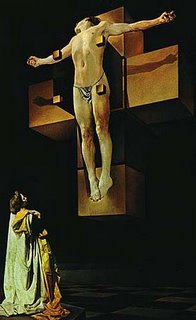 The first three stanzas of The Wreck of the Deutschland are as erotic as Tristan und Isolde and describe a three-part climax of spiritual movement—1) God’s mastering call; 2) the person’s swooning response; and 3) the explosion of union. And they root this love-making in the Blessed Sacrament at Mass, or in the Tabernacle during an hour of silent adoration, the “Host” . . .and further, “with a fling of the heart to the heart of the Host”. This is no mythic generalized spirituality but rather a real thing, a real love-making with the real God Who became a real Man in Jesus Christ, sacrificing Himself on the Cross and rising from the dead, ascending to this Father and sending His Holy Spirit so that we could encounter Him, know Him, and become one in Him in the Eucharist.
The first three stanzas of The Wreck of the Deutschland are as erotic as Tristan und Isolde and describe a three-part climax of spiritual movement—1) God’s mastering call; 2) the person’s swooning response; and 3) the explosion of union. And they root this love-making in the Blessed Sacrament at Mass, or in the Tabernacle during an hour of silent adoration, the “Host” . . .and further, “with a fling of the heart to the heart of the Host”. This is no mythic generalized spirituality but rather a real thing, a real love-making with the real God Who became a real Man in Jesus Christ, sacrificing Himself on the Cross and rising from the dead, ascending to this Father and sending His Holy Spirit so that we could encounter Him, know Him, and become one in Him in the Eucharist.I did say yes
O at lightning and lashed rod;
Thou heardst me truer than tongue confess
Thy terror, O Christ, O God;
Thou knowest the walls, altar and hour and night:
The swoon of a heart that the sweep and the hurl of thee trod
Hard down with a horror of height:
And the midriff astrain with leaning of, laced with fire of stress.
The frown of his face
Before me, the hurtle of hell
Behind, where, where was a, where was a place?
I whirled out wings that spell
And fled with a fling of the heart to the heart of the Host.
My heart, but you were dovewinged, I can tell,
Carrier-witted, I am bold to boast,
To flash from the flame to the flame then, tower from the grace to the grace.
Stanza Two confirms this metaphor of the wrestling with God: “I did say yes.” It is a wrestling at night, at prayer, in a chapel—and it is a “swoon” and a “sweep” and a “hurl” and a “midriff . . .laced with fire of stress.” It is a moment when Hopkins says Yes to the call of God—in his own life, perhaps the call to join the Roman Catholic Church or to enter the Jesuits, or perhaps some other night of prayer. It is a moment of a response to God, and an urgent response to an urgent call. This is a real experience, a real thing, . . .and it has been so in the lives of many real Christian persons.
Stanza Three---“the frown of his face” is God’s judgement ahead, “the hurtle of hell” is the penalty, and the person becomes a “dovewinged” dove, “carrier-witted” who flies at the Blessed Sacrament in an aim described as both “fire” and “grace.” Even this climax of rest is an explosion.
Balthasar sees that Hopkins’ poem is the landscape on which the real person encounters the real God—especially in the hour of decision, of choice, of answer, of personal response to a call, of personal vocation, of encounter.

No comments:
Post a Comment